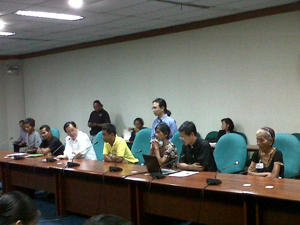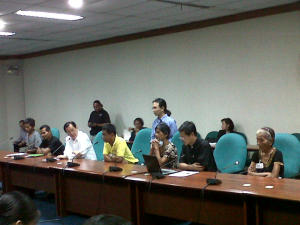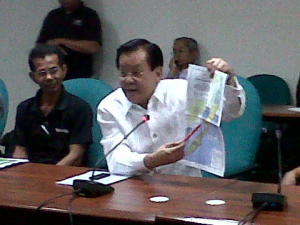By JONATHAN DE SANTOS
CLOSE to 3,000 families in Casiguran, Aurora stand to lose land that many of them have been tilling for half a century to make way for the extension of a Freeport zone that critics say does not benefit the community at all.
The Catholic Bishops Conference of the Philippines (CBCP), which has been supporting the families in their struggle to own the land being transformed into the Aurora Pacific Economic Zone and Freeport Authority (APECO), blamed the farmers’ problems on a “powerful political dynasty” at a press conference at the Senate Tuesday.
Fr. Edwin Gariguez of the CBCP’s National Secretariat for Social Action (CBCP-NASSA), who was at the press conference, called APECO a case of “large-scale plunder and landgrabbing,” citing the questionable purchase by APECO of land from provincial environmental officer Benjamin Miña at P650,000 per hectare but paying only P45,000 per hectare to displaced residents.
Gariguez said, “The Philippine government has already shelled out more than P800 million to fund APECO’s construction, even though the ecozone has brought almost no benefits to the marginalized sectors of Casiguran.”
The dynasty Gariguez was referring to are Sen. Edgardo Angara and his son, Aurora Rep. Juan Edgardo Angara, both of whom sponsored legislation creating the 12,923-hectare Freeport, the country’s first on the Pacific coast.
Representative Angara is on the APECO board as is his aunt, Aurora Gov. Bellaflor Angara-Castillo, who is vice chairperson.
Senator Angara denied allegations made by anti-APECO advocates. The younger Angara, meanwhile, said APECO has resulted in the improved road network from Manila to the eastern side of Luzon. He said the Baler-Casiguran road has cut down travel time between Casiguran and Manila to eight hours from the usual three days.
“Parts of Baler-Casiguran road used to be submerged during rainy season. Now there are 11 bridges and a concrete road,” he added.
Florentina Solis said Caisuguran was just forest when she and her family settled there in 1963. “Dugo at pawis ang punuhunan naming, ni isang kusing walang galing sa gobyerno (We invested blood and sweat; not a single centavo came from government),” she told reporters.
She has been trying to get a land title since 1972, but she fears that may never happen because APECO wants her land for expansion projects.
Adarlina Constantino, who has been in Casiguran since 1962, also risks losing her land to APECO. “Wala po ba kaming karapatan mag may-ari ng lupa na 50 years na naming ibinubungkal (Don’t we, who have tilled the land for 50 years, have the right to own land?)” she said.
Already, she said, the community’s land has gotten smaller after APECO fenced off access to the beach.
Constantino added that a nearby river has been quarried for rocks used to build APECO’s administration building and an airport runway. Twenty-eight families have also been displaced for these.
Members of Task Force Anti-APECO who went to the Senate on Tuesday said both the administration building and the airport remain largely unused. Aside from charter flights bringing potential investors to the Freeport zone, there is little activity in APECO, they said.
Sen. Sergio Osmeña III, who called the press conference, said APECO will likely see very little economic activity despite the close to P2 billion that the government has spent to develop the area. He said huge waves and the risk of typhoons along the coast make the area unattractive to shipping.
Osmeña said APECO also has to contend with the long distance that cargo will have to travel from Manila and Central Luzon.
APECO says on its website that Casiguran offers a “perfect transshipment hub for different countries exporting products to countries especially those located in Asia, Australia, North and South America.”
Osmeña said he supports Task Force Anti-APECO because he wants to help affected residents and also because “from the point of view of policy, I am against freeports.”
He said freeports bring “no real advantage to the whole country” and the lower tariffs offered to investors are useless in the face of an Association of SoutheastAsian Nations Free Trade Agreement that will come into force in 2015.
Indigenous Agta Dumagats, who say APECO bought up logging rights to their ancestral domain without their free, prior and informed consent, also see no real advantage from APECO.
Agta tribe member Armand Dela Cruz told reporters there were no negotiations with his people over the use of their ancestral domain. Instead, Task Force Anti-APECO said, APECO bought the logging rights from Industries Development Corporation for P120 million. This deal “came at the total expense of the struggle of the Casiguran Agtas for the recognition of their ancestral domains.”
On Nov. 24, 125 residents of Casiguran began a 370-kilometer march that is expected to end at Malacañang on Dec. 14. The march is meant to show their opposition to the continued existence of APECO.
Among their demands are an independent review of APECO and the allocation of a budget of zero for APECO on the 2013 national budget.
The marchers are also calling on the Fisheries bureau to make sure fisherfolk already displaced by APECO will be given areas for resettlement and on the Department of Agrarian Reform to distribute 105 hectares of prime agricultural land to farmer settlers like Solis and Constantino.
Stewardship contracts with 90 households under the Integrated Social Forestry Program of the Department of the Environment and National Resources should be respected in 288 hectares covered by APECO, they said.
But APECO says the marchers represent a small percentage of Casiguran residents. Kent Avestruz, spokesman for APECO, told VERA Files over the telephone that an assembly of residents held on Nov. 22 was attended by around 2,800 residents—including representatives of 800 Dumagat households—who do support the existence of the Freeport.
He said APECO has been holding consultations with residents on “what kind of development (they) want.” That development includes relocation areas for people displaced by APECO projects, he said.
In the meantime, APECO has been paying for livelihood projects in seaweed, bamboo and rambutan farming for 120 families.
The 40 families given capital to farm one-fourth hectare of seaweed are expected to earn up to P40,000 every two months, Avestruz said.
Output from the projects will be processed by six locators, or investors, already in APECO, he said, adding it is “very premature” to say the Freeport zone has not resulted in development.
“We are still a young economic zone,” he said.


